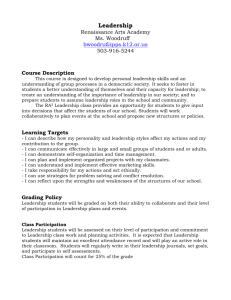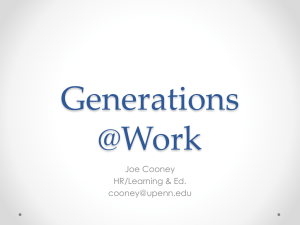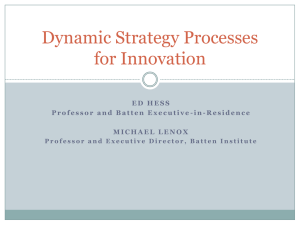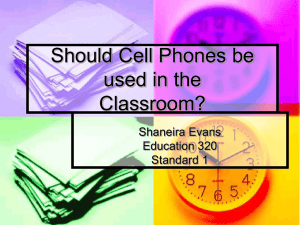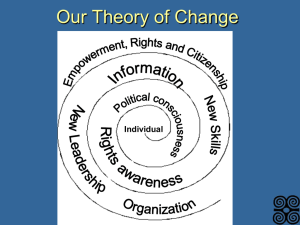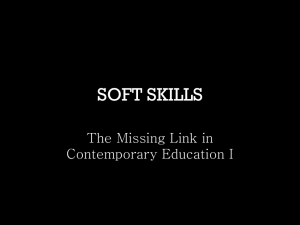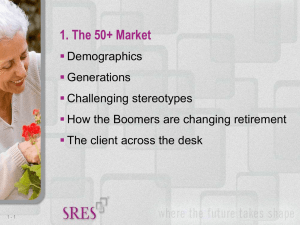Personal and Lifestyle Characteristics – Generation X
advertisement
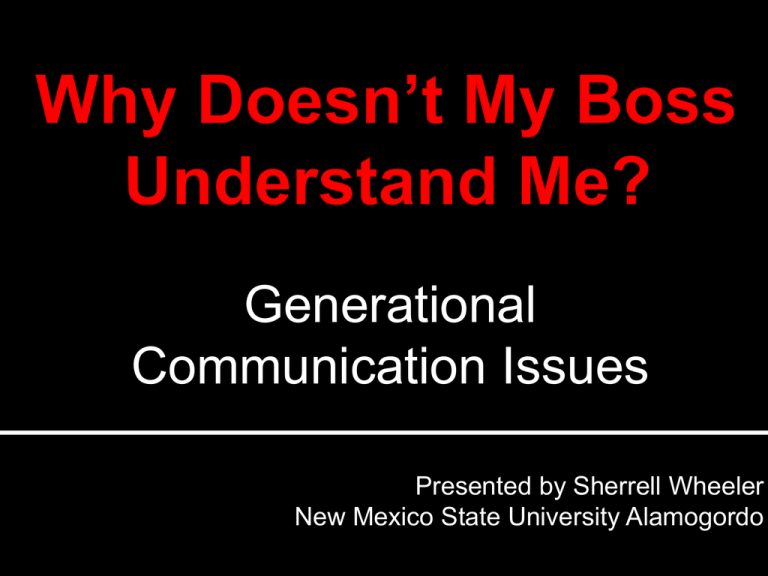
Generational Communication Issues Presented by Sherrell Wheeler New Mexico State University Alamogordo You’re right, but I’m the boss! Just do your job! I remember when . . . The kid wants a promotion after six months on the job! No! It’s five, I’m out of here! Remembers life without a cell phone… Remembers getting off the couch to change the channel on the TV… Remembers black & white TV… Has ever owned a “vinyl record”… Has ever owned an “8 track tape”… Has never owned a record player. Can’t believe baby diapers were once made of cloth. Doesn’t care who shot JR. Never thought of Jaws while you were swimming in the sea. Think the Vietnam War is as ancient as World Wars I and II. Has only known a world with AIDS. Can understand the following: “c u b4 2nite” Understand the four generations currently in the workforce Understand generational differences in key workplace dimensions Learn how to prepare your students to communicate with a representative of any generation at their workplace First time to have four different generations together in the workforce Generational differences can affect everything Each generation has distinct attitudes, behaviors, expectations, habits and motivational buttons. Each generation struggles to understand the others. Each generation tends to be shaped or influenced by its environment and experiences May have different meanings for the word “employment” May have different communication styles It is important to narrow any “generation gaps” in order to work well with others 1922-1945 Traditionalists Silent 1965-1979 Generation X Gen X Xers 1946-1964 Baby Boomers 1980-2000 Generation Y Gen Y Millennial Echo Boomers Family Respect for authority Conformers Discipline Traditional Nuclear Education A dream Communication Media Rotary phones One-on-one Write a memo Dealing with Money Put it away Pay cash Core Values Core Values Optimism Involvement Family Disintegrating Education A birthright Communication Media Touch-tone phones Call me anytime Dealing with Money Buy now, pay later Core Values Family Education Skepticism Fun Informality Latch-key kids A way to get there Communication Media Cell phones Call me only at work Dealing with Money Cautious Conservative Save, save, save Core Values Family Education Realism Confidence Extreme fun Social Merged families An incredible expense Communication Media Internet Picture phones E-mail Dealing with Money Earn to spend Work Ethic and Values Hard work Respect authority Sacrifice Duty before fun Adhere to rules Work is . . . An obligation Leadership Style Dictatorial and rigid Command-and-control Interactive Style Individual Communications Formal Memo No news is good news Satisfaction in a job well done Feedback and Rewards Messages That Motivate Work and Family Life Your experience is respected Ne’er the twain shall meet Work Ethic and Values Workaholics Work efficiently Personal fulfillment Desire quality Work is . . . An exciting adventure Leadership Style Consensus-building approaches Collegial/People oriented Interactive Style Team player Loves to have meetings Communications In person Feedback and Rewards Messages That Motivate Work and Family Life Don’t appreciate it Money Title recognition You are valued and needed Your contribution is unique and important No balance Work to live Work Ethic and Values Flexibility - work whenever, just get it done Self-reliance Not looking for longevity or lifetime position Skeptical Work is . . . A difficult challenge A contract Leadership Style Everyone is the same Challenge others Ask why Interactive Style Entrepreneur Communications Direct Immediate Sorry to interrupt, but how am I doing? Freedom is the best reward Feedback and Rewards Messages That Motivate Work and Family Life Do it your way Forget the rules Balance Work Ethic and Values Work is a way to fill time between weekends Not likely to seek out additional responsibility Tolerant Goal oriented Work is . . . A means to an end Fulfillment Leadership Style Honesty Integrity Team oriented Interactive Style Participative Communications E-mail Voice mail Whenever I want it, at the push of a button Meaningful work Feedback and Rewards Messages That Motivate Work and Family Life You will work with other bright, creative people Balance Everyone is comfort seeking Most people resist change, but don’t like status quo either Everyone wants information, to be kept “in the loop” Everyone likes some level of control We are good for each other, Let’s challenge each other, Let’s communicate with each other! Respect and acknowledge their expertise Follow the chain of command Speak positively of the organization Show interest in the work being done Appreciate their insights Be patient of their approach to technology Don’t refer to their age Acknowledge their experience and dedication Seek them out as mentors Find a balance between face-to-face and technological communication Use them as “sounding boards” Focus on relationships as well as results Show them you can carry your share of the load Acknowledge their talents and expertise Be clear and specific, get to the point Rely on technology for communicating Place a high premium on efficiency Understand their need for balance Encourage a friendly and informal work enviroment Acknowledge their talents and fresh perspectives Be open to new and different ways to work Encourage and embrace technology Involve them in projects of significance Show them respect as team members Offer to be a mentor Build a fun, challenging and fast-paced work environment Agency loyalty - From organizational to individual Chain of command - From rigid to freedom Work ethic - From corporate to individual Workplace diversity - Gen Y is colorblind Feedback and mentoring - Differences in communication styles Know who you’re working with Create a climate for and of RESPECT Communicate openly and honestly Use the A List Accept your “mutual rightness” Acknowledge your interdependency on each other generation Appreciate what you have in common Assume responsibility for making your relationships better Adopt the “Platinum Rule” The “Golden Rule” (in modern terms) – treat others the way ‘you’ want to be treated. The “Platinum Rule” – treat others the way they want to be treated.

